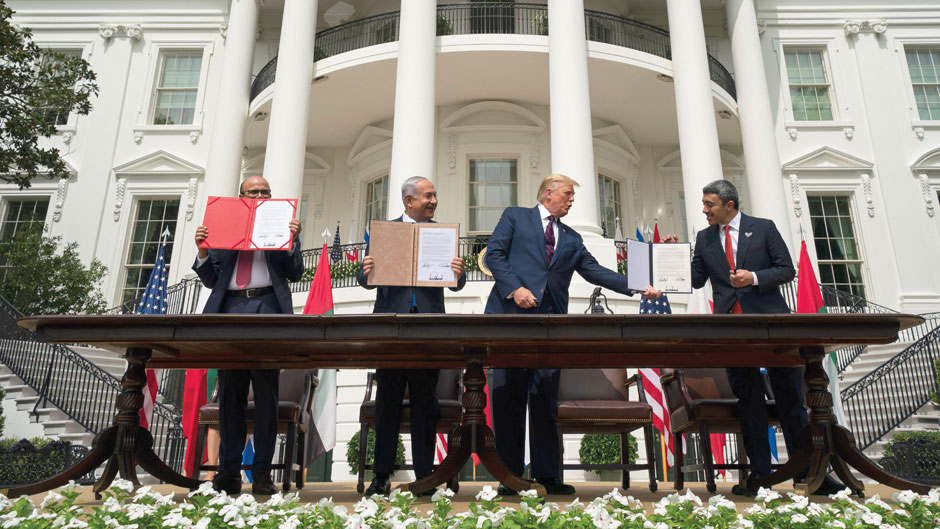Aminating the diplomatic arrangements signed by Israel and two states of the Persian Gulf, the United Arab Emirates and Bahrain, was neither the dramatic statesmanship of Egypt’s Anwar Sadat—whose journey to Jerusalem in 1977 would bring about an historic peace—nor the anguished compromises of 1993 affected by Israel’s Yitzhak Rabin and Yasser Arafat, the Palestinian leader. The accords signed Tuesday may hold the promise of a new Middle East, but they might also be seen as clarification of an existing configuration of power.
The old Arab order from which Sadat broke ranks with his “separate peace,” and within which Arafat maneuvered his stateless nation, has been visited by a series of shocks from which it has not recovered, from the United States’ invasion of Iraq to the Arab Spring and the conversion of once strong states into arenas of civil war, problems more acute in the time of Covid-19. Amid the ruins, Sunni leaders, anxious in the face of their perception of Iran’s ascendency and the erosion of the U.S.’s interest in the region, have found in Israel a strategic ally, perhaps even a guarantor of security.
For many years tacit understandings between Israel and the Sunni powers rested upon a system of subtleties in which expressions of loyalty to the idea of Palestine as a legitimating principle of the Arab order were balanced by considerations of national interest. In this less subtle moment, the matter of Palestine, its internal divisions, search for national dignity, the settlements and territorial negotiations, could be shaped by still more direct calculation of advantage among states in the region.
With its ecumenical promise, the “Abraham Accords” also highlight the power of domestic factors in U.S. foreign policy. President Donald J. Trump has presented his peacemaking as a populist alternative to the “endless wars” authored by U.S. “globalists,” while affirming his Christian Zionist supporters and adding a profitable account to the deal book of U.S. statecraft. These negotiations could not have been easy to conclude. And it will be the challenge for the Trump administration to convert what might seem a transaction, a “hegemonic peace” or military alliance against Iran, to a larger regional design, aligning arrangements of raw power with a principle of legitimacy upon which a new order might be defined.
It was below the Truman Balcony at the White House that the accords were signed. Harry Truman was the president who recognized the new state of Israel in 1948. And for all of the trials associated with Israel’s navigation through the decades since then, formal recognition by these Persian Gulf states speak to the perseverance of Israel, about which it had been incorrectly assumed that its definition of security would preclude regional acceptance. For the Gulf states too, whose diplomatic suppleness has allowed these vulnerable countries to thrive, the accords must carry with them a measure of historical satisfaction. Additional Gulf states may recognize Israel, participating in what promise to be mutually beneficial economic ties, and countries elsewhere in the greater Middle East could follow.
For a region in the half-light, with countries cascading between order and anarchy, a regional environment riven by the rival designs of its major powers and an international system in crisis, the accords could provide the merit of clarifying the landscape of power in the Middle East, itself a mechanism of stabilization. Yet without the “escape clauses” of a tacit system, the region’s leaders, and those further afield seeking expansion of the accords, will need to take care that alliances of nuance, ones accommodating competing agendas existing within the context of a general strategic consensus, not be replaced with coalitions of rigidity, self-propelled in the name of unity toward new forms of insecurity. In either reading, Israel’s integration into the security architecture of the Arab world seems likely to deepen.
Bradford R. McGuinn is a senior lecturer with a focus on Middle Eastern studies in the University of Miami College of Arts and Sciences’ Department of Political Science.

